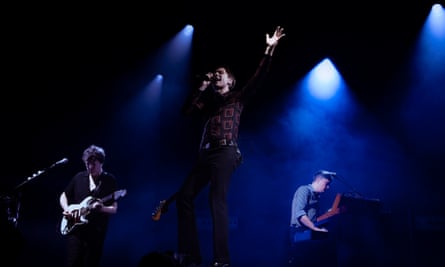“Take it right down to the sweet Mancunian ground,” instructs Franz Ferdinand frontman Alex Kapranos. Telling the audience to drop before rocketing them back up like a firework by restarting the music is an old trick, and one that can fall flat as often as it works. But the hefty crowd at Manchester’s Victoria Warehouse dutifully obey and drop in unison. The band detonates via a stretched out and frenetic version of This Fire, and the crowd explodes along with them.
The moment feels emblematic of Franz Ferdinand as a whole, now 20 years into their career and touring a greatest hits record. Despite always operating in familiar territory, both musically and via tried and tested stage antics, there is an enduring, endearing quality to them that refuses to fade.
While many of the songs played tonight are still the same spiky, fervent, pop-laced guitar bursts they were knocking out nearly two decades ago – see the stomping riff of Do You Want To – the band also feel notably different. Aside from having retained only two out of four original members, their trajectory has seen them go from being disciples of Scottish indie lineage, turning countless teenage NME readers in the 2000s on to Orange Juice, Fire Engines and Yummy Fur, into a precision-drilled theatrical pop outfit.
Kapranos has always had a knack for working the stage but he fully embraces his inner showman tonight, knowingly hamming it up as he runs through the entirety of the rock star stage moves manual – at one point standing on top of an amp with his own name on it, guitar outstretched to the heavens. He possesses a slight cockiness but it always stays on the right side of charming. The band (Bob Hardy, Dino Bardot, Julian Corrie, Audrey Tait) are superb: locked-in, intuitive, fun, fierce. Always Ascending sees them dive into pure Talking Heads domain: zippy guitars bounce as vocal harmonies layer up and the pace accelerates, teetering close to frantic chaos but never descending into it.
The band’s neat ability to blend art-pop, disco-rock, indie bangers and post-punk – peppered with references to the Soviet-era and dadaism – remains a unique one. With some corners of the internet trying to convince themselves that mid-2000s indie is some kind of en-vogue hot property once again, it does hit home how many of Franz Ferdinand’s one-time peers failed to find the same quality of output and longevity.
A song such as Take Me Out, which has become ubiquitous over the last two decades, should by all standards of rational thinking and logic sound profoundly irritating and dated in 2022. Instead, it shines – as crunchy as it is sharp, and driven by a riff so deeply embedded into the British psyche it appears to have transcended time itself.

